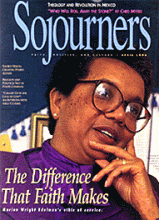Like many U.S. Christians, Garland Robertson had moral concerns about the Persian Gulf war. And like many others, Robertson expressed his concerns in a letter to the local newspaper. But for Robertsona Southern Baptist chaplain in the U.S. Air Forcethe letter to the editor may yet cost him his job, his pension, and even his good name.
It all started two weeks before the beginning of the Gulf war, in January 1991, when Robert-sona chaplain at Dyess Air Force Base in Abilene, Texaswrote to the Abilene Reporter-News to advocate a nonviolent response to the Iraqi invasion of Kuwait. Three days later, Robertson received an official reprimand from his base commander, who wrote that Air Force members are "prohibited from engaging in political activities," and that "Operation Desert Shield is decidedly a partisan political matter."
Robertson responded that a military offensive in the Gulf could not "be justified morally by any Christian tradition. As a pastor," he wrote, "I cannot be silent while leaders of our nation move dangerously close to beginning an armed conflict with Iraq for which alternatives appear to be the more moral option."
Since then, Robertson says, his military commanders have sought to drum him out of the service. "The Air Force psychologist stated that after I wrote the letter, the senior chaplain told him that he wanted my head," Robertson told Sojourners. A board of inquiry moved in September 1993 to discharge Robertson and take away his pension; his appeal was scheduled to be heard in February by Air Force Secretary Sheila E. Widnall.
At the heart of the issue, according to Robertson, is the structure of the military chaplaincy itself. Chaplains are part of the military chain of commandand are paid by the governmentleading Robertson to tell The New York Times, "The most pressing issue is: Are we ministers of the church or ministers of the state?"
Read the Full Article
